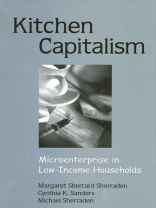The first in-depth examination of self-employment from the perspectives of low-income entrepreneurs.
Businesses come to life as owners are allowed to speak in their own words in this first in-depth examination of self-employment told from the perspectives of low-income microentrepreneurs. The book systematically analyzes a range of issues, including who chooses to open a micro business, and why; what resources do they bring to their business venture; how well will their venture fare; and what contributes to the growth or decline of their business. The authors conclude that most microentrepreneurs believe self-employment offers a range of monetary and nonmonetary benefits and argue it would be more advantageous to view microenterprise as a social and economic development strategy rather than simply as an anti-poverty strategy. Based on this observation, a range of strategies to better promote microenterprise programs among the poor is advanced, with the goal of targeting the most promising approaches.
สารบัญ
List of Tables
Acknowledgments
1. Little Businesses, Large Hopes
2. Theory and Evidence
3. Who Wants to Be a Microentrepreneur and Why?
4. Getting Started: Resources for Microenterprise
5. The Bottom Line: Business and Household
6. Microenterprise Performance
7. Beyond Profit: Multiple Outcomes of Microenterprise
8. Fighting Poverty or Promoting Development?
Appendix A. Glossary
Appendix B. Research Methods
Appendix C. Entrepreneurs, Demographic Characteristics, and Their Businesses
Appendix D. Business and Household Financial Outcomes
References
About the Authors
Index
เกี่ยวกับผู้แต่ง
At the University of Missouri at St. Louis, Margaret Sherrard Sherraden is Professor of Social Work, and Cynthia K. Sanders is Assistant Professor of Social Work. Michael Sherraden is Benjamin E. Youngdahl Professor of Social Development and the founding director of the Center for Social Development at Washington University, where Margaret Sherrard Sherraden is Research Professor and Cynthia K. Sanders is Faculty Associate. Michael Sherraden is the author and editor of many books, including Assets and the Poor: A New American Welfare Policy.












